Ditapis dengan

Laporan Kegiatan Workshop: Sinergi Jamkesmas-Jamkesda dan Arah Perkembanganny…
Upaya peningkatan derajat kesehatan bagi penduduk khususnya penduduk miskin saat ini menjadi fokus pemerintah pusat dan daerah. Sejak tahun 2005 Pemerintah dalam hal ini Departemen Kesehatan (saat ini Kementerian Kesehatan) mengeluarkan kebijakan Jaminan Pemeliharaan Kesehatan Masyarakat Miskin yang lebih dikenal dengan Askeskin dan dikelola oleh PT. ASKES. Askeskin adalah jaminan kesehatan yan…
- Edisi
- 1
- ISBN/ISSN
- -
- Deskripsi Fisik
- PDF, 78 Halaman
- Judul Seri
- Hasil Digitalization
- No. Panggil
- 368.4 TNP. L
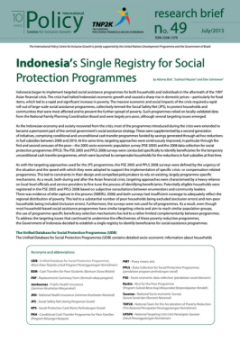
Indonesia’s Single Registry for Social Protection Programmes
Indonesia began to implement targeted social assistance programmes for both households and individuals in the aftermath of the 1997 Asian financial crisis. The crisis had halted Indonesia’s economic growth and caused a sharp rise in domestic prices—particularly for food items, which led to a rapid and significant increase in poverty. The massive economic and social impacts of the crisis r…
- Edisi
- 1
- ISBN/ISSN
- -
- Deskripsi Fisik
- PDF, 6 Halaman
- Judul Seri
- Policy Brief
- No. Panggil
- 368.4 BAH.I
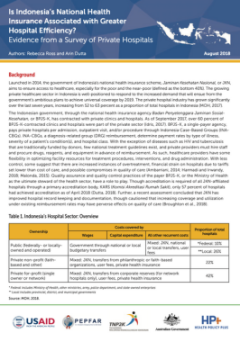
Is Indonesia’s National Health Insurance Associated with Greater Hospital …
Launched in 2014, the government of Indonesia’s national health insurance scheme, Jaminan Kesehatan Nasional, or JKN, aims to ensure access to healthcare, especially for the poor and the near-poor (defined as the bottom 40%). The growing private healthcare sector in Indonesia is well-positioned to respond to the increased demand that will ensue from the government’s ambitious plans to ac…
- Edisi
- 1
- ISBN/ISSN
- -
- Deskripsi Fisik
- PDF, 7 Halaman
- Judul Seri
- Policy Brief
- No. Panggil
- 368.3 TNP.I
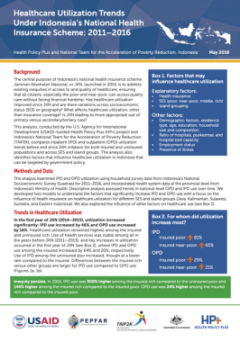
Healthcare Utilization Trends Under Indonesia’s National Health Insurance S…
The central purpose of Indonesia’s national health insurance scheme Jaminan Kesehatan Nasional, or JKN, launched in 2014, is to address existing inequities in access to and quality of healthcare, ensuring that all citizens, especially the poor and near-poor, can access quality care without facing financial hardship. Has healthcare utilization improved since JKN and are there variations across…
- Edisi
- 1
- ISBN/ISSN
- -
- Deskripsi Fisik
- PDF, 2 Halaman
- Judul Seri
- Policy Brief
- No. Panggil
- 368.3 TNP.H
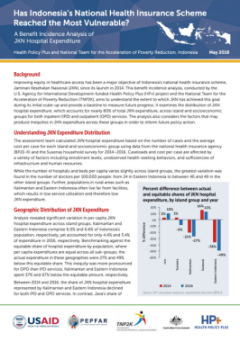
Has Indonesia’s National Health Insurance Scheme Reached the Most Vulnerabl…
Improving equity in healthcare access has been a major objective of Indonesia’s national health insurance scheme, Jaminan Kesehatan Nasional (JKN), since its launch in 2014. This benefit incidence analysis, conducted by the U.S. Agency for International Development-funded Health Policy Plus (HP+) project and the National Team for the Acceleration of Poverty Reduction (TNP2K), aims to under…
- Edisi
- 1
- ISBN/ISSN
- -
- Deskripsi Fisik
- PDF, 2 Halaman
- Judul Seri
- Policy Brief
- No. Panggil
- 363.8 TNP.H
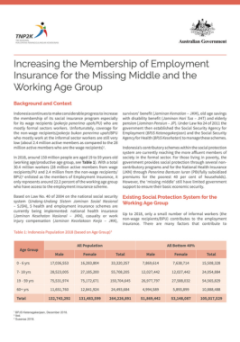
Increasing the Membership of Employment Insurance for the Missing Middle and …
Indonesia continues to make considerable progress to increase the membership of its social insurance program especially for its wage recipients (pekerja penerima upah/PU) who are mostly formal sectors workers. Unfortunately, coverage for the non-wage recipients/pekerja bukan penerima upah/BPU who mostly work at the informal sector workers are still very low (about 2.4 million active members as …
- Edisi
- 1
- ISBN/ISSN
- -
- Deskripsi Fisik
- PDF, 2 Halaman
- Judul Seri
- Policy Brief
- No. Panggil
- 363.3 LAR.I
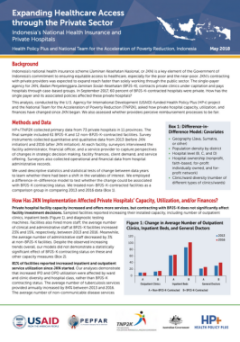
Expanding Healthcare Access through the Private Sector Indonesia’s Nation…
Indonesia’s national health insurance scheme (Jaminan Kesehatan Nasional, or JKN) is a key element of the Government of Indonesia’s commitment to ensuring equitable access to healthcare, especially for the poor and the near-poor. JKN’s contracting with private providers was expected to expand reach faster than solely working through the public sector. The single-payer agency for JKN, B…
- Edisi
- 1
- ISBN/ISSN
- -
- Deskripsi Fisik
- PDF, 2 Halaman
- Judul Seri
- Policy Brief
- No. Panggil
- 368 USA.E
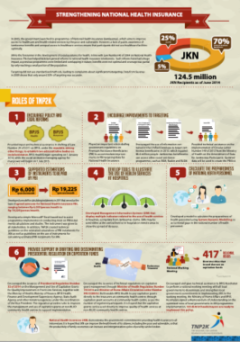
Strengthening National Health Insurance
- Edisi
- -
- ISBN/ISSN
- -
- Deskripsi Fisik
- PDF, 1 Halaman
- Judul Seri
- Info Grafis
- No. Panggil
- 368.3 TNP. S
- Edisi
- -
- ISBN/ISSN
- -
- Deskripsi Fisik
- PDF, 1 Halaman
- Judul Seri
- Info Grafis
- No. Panggil
- 368.3 TNP. S
 Karya Umum
Karya Umum  Filsafat
Filsafat  Agama
Agama  Ilmu-ilmu Sosial
Ilmu-ilmu Sosial  Bahasa
Bahasa  Ilmu-ilmu Murni
Ilmu-ilmu Murni  Ilmu-ilmu Terapan
Ilmu-ilmu Terapan  Kesenian, Hiburan, dan Olahraga
Kesenian, Hiburan, dan Olahraga  Kesusastraan
Kesusastraan  Geografi dan Sejarah
Geografi dan Sejarah